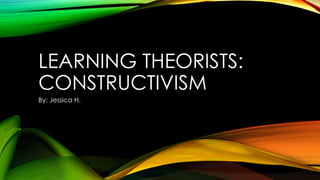
Learning theorists
- 2. CONSTRUCTIVISM: Constructivists believe that learning is an active, constructive process and that the learner constructs information based upon prior knowledge. Here knowledge is built upon personal experiences and hypotheses gained from the surrounding environment. Learners have the opportunity to test these hypotheses with social negotiation, where each person interprets and constructs knowledge differently. The learner is not considered to be a blank slate because they bring past experiences and cultural factors to the learning table. “NOTE: A common misunderstanding regarding constructivism is that instructors should never tell students anything directly but, instead, should always allow them to construct knowledge for themselves. This is actually confusing a theory of pedagogy (teaching) with a theory of knowing. Constructivism assumes that all knowledge is constructed from the learner’s previous knowledge, regardless of how one is taught. Thus, even listening to a lecture involves active attempts to construct new knowledge.”
- 3. JEAN PIAGET (1896 - 1980) Piaget was a psychologist who, after observing his own children for many years, developed the cognitive learning theory (note chart below). He believed that children were actively constructing new knowledge as they moved through different cognitive stages by building on what they already knew. Also, the interpretation of this knowledge differs as children progress through the different stages. Piaget determined that children assimilate new knowledge as they experience new things and adapt and accommodate with this new knowledge to change their knowledge base and make sense of the world around them. Cognitive Stages Ages (Approximate) Characteristics of Learning Sensorimotor Birth to 2 years Imitation, learn through senses and motor activities, do not understand the world around them, and egocentric Preoperational 2 to 6/7 years Egocentric, pretend play, drawing ability, speech and communication development, concrete thinking, and intuitive reasoning Concrete operational 6/7 to 11/12 years Classification, logical reasoning, problem solving, and beginnings of abstract thinking Formal operational 11/12 years through adulthood Comparative reasoning, abstract thinking, deductive logic, and test hypotheses
- 4. JEROME BRUNER (1915 - ) “Brunner proposed that learning is an active process in which the learner constructs new ideas or concepts based on his current or past knowledge.” He believes that learners need to participate to learn and that they need to be actively engaged in the learning process. It is Brunner’s belief that teachers should encourage their students to explore, inquire, and discover for themselves. He came up with the idea of the spiral curriculum, where the learning curriculum is organized spirally so that students can continually build upon what they have already learned.
- 5. LEV VYGOTSKY (1896 – 1934) Vygotsky believed that social development greatly influenced learning. He was under the belief that a child’s social environment could either positively or negatively affect the child’s cognitive development. “Vygotsky’s Social Development Theory: 1. Social interaction plays a fundamental role in the process of cognitive development. In contrast to Jean Piaget’s understanding of child development (in which development necessarily precedes learning), Vygotsky felt social learning precedes development. He states: “Every function in the child’s cultural development appears twice: first, on the social level, and later, on the individual level; first, between people (interpsychological) and then inside the child (intrapsychological).” (Vygotsky, 1978). 2. The More Knowledgeable Other (MKO). The MKO refers to anyone who has a better understanding or a higher ability level than the learner, with respect to a particular task, process, or concept. The MKO is normally thought of as being a teacher, coach, or older adult, but the MKO could also be peers, a younger person, or even computers. 3. The Zone of Proximal Development (ZPD). The ZPD is the distance between a student’s ability to perform a task under adult guidance and/or with peer collaboration and the student’s ability solving the problem independently. According to Vygotsky, learning occurred in this zone.”
- 6. JOHN DEWEY (1859 – 1952) Dewey is sometimes called the Father of Progressivism, another learning theory. He was an educational psychologist, philosopher, and political activist that advocated student- centered learning. Dewey believed that educators should combine concrete and practical activities that would be relevant to their students’ lives. He felt that school should be an extension of society and students should be active participants in it. He was under the belief that students learn by doing and should be allowed to construct , create, and actively inquire.
- 7. CLASSROOM IMPLICATIONS: What the teacher does under this theory (with and without technology): Teachers can create student- centered activities that actively engage students in the learning process. With technology: Web Quests, scavenger and treasure hunts, and curriculum resource pages. Without technology: collaborative learning (using group work), using hands- on activities What the students do under this theory (with and without technology): Students complete a variety of activities while learning about a topic. With technology: Web Quests, scavenger and treasure hunts, and interactive learning games. Without technology: playing an instrument, building something with Legos, drawing what they see, and reading books.
- 8. WHAT YOU THINK ABOUT THE THEORY FOR YOUR OWN TEACHING? : I think that constructive learning is a very good way of obtaining knowledge. It’s informative while being fun and motivational as well. I agree with many of the ideals of constructivism and would definitely integrate it into my classroom in the future. Since I learn best by doing most of the time, myself, I can see where constructivist are coming from. I do however, understand that not all students learn the same way so I know that I will have to integrate other means of instruction.
- 9. SOURCES: Pictures: http://www.flickr.com/photos/1029 89169@N03/9905610956/sizes/o/in/ photolist-g6jR2N-9w5Gfn-9w5GgZfo6jUJ-855vVp-g6i8Th-d69m5WhqFVtQ-c6sPPy-hqFVVw-hqFVVbhqFVFU-hqFV8u-bc77vx-bc77kMbc77rM-8x5kCR-8x5kpX-8x8kXu8x8mg3-8x8m6d-8x5kw8-9kcPZQdKvCJb-g6jrLu-bfbL1k-9qjwjT9qnzv7-9W6vTV-a7jD6K-7BhNTq7BhQtd-7Be22a-b1c9zX-g6j65uaYhRFV-g6mAP5-dHnGEa-ehJPkd9w8JvJ-8PgKfT-8M1oMi-8MigAW8MiMCG-8NE2WV-8NVcHN8wGEL4-8w4bhR-8vu54S-8w9cgu8whF1A/ http://www.flickr.com/photos/mirjo ran/455878802/sizes/o/in/photolistGhuTm-2a6L7j-2a6Pvu-4Bfuou4UVi82-7mfh8C-gwzos4-88QqdpfpCGjt-8uHtCp-8uHtG2/ http://www.uky.edu/~eushe2/quota tions/bruner.html http://es.wikipedia.org/wiki/Lev_Vyg otski http://www.rugusavay.com/johndewey-quotes/ http://en.wikipedia.org/wiki/File:Islin gton_College_Multimedia_Lab.jpg http://en.wikipedia.org/wiki/File:Arg onne_lab_education.jpg Internet: http://www.learningtheories.com/constructivism.html http://www.learningtheories.com/category/construc tivist-theories Textbook (MLA Citation): Shelly, Gary B., Glenda A. Gunter, and Randolph E. Gunter. Teachers Discovering Computers: Integrating Technology in a Connected World. N.p.: n.p., n.d. Print.